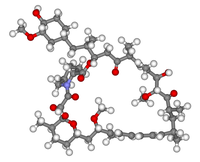
Photo from wikipedia
Pancreatic cancer is the fourth leading cause of cancer‐related death in the United States. While Gemcitabine‐based chemotherapy is the first‐line treatment for locally advanced pancreatic cancer, its resistance is a… Click to show full abstract
Pancreatic cancer is the fourth leading cause of cancer‐related death in the United States. While Gemcitabine‐based chemotherapy is the first‐line treatment for locally advanced pancreatic cancer, its resistance is a large obstacle in the field. Understanding the molecular basis of gemcitabine resistance is therefore critical for increasing the efficacy of gemcitabine‐based chemotherapy and improving the survival rate of the cancer patients. Here, we investigated the sensitivity of a pair of established human pancreatic cancer cell lines, MIAPaCa‐E (relatively sensitive to gemcitabine, called GS), and MIAPaCa‐M (highly resistant to gemcitabine, called GR) to various inhibitors of EGFR or PI3K/AKT/mTOR pathways. We found that compared to GS cells, GR cells were resistant to all the tested inhibitors of EGFR, AKT, and PI3K, but were equally, if not more sensitive to the mTOR inhibitor everolimus. Mechanistically, everolimus treatment decreased levels of total mTOR and Ser2248‐phosphorylated mTOR protein in GR over GS cells, suggesting greater inhibition of mTOR by everolimus in GR cells. High levels of Thr389‐ and Thr371‐phosphorylated p70S6 protein (a mTOR substrate) were found in GR cells treated with gemcitabine, but not everolimus, supporting that inhibition of p70S6 protein phosphorylation by everolimus is associated with its ability to overcome gemcitabine resistance. Everolimus also induced higher levels of caspase‐3/‐7 activation in GR over GS cells, and everolimus‐mediated mTOR inhibition lead to G2 arrest in GR cells but G1 arrest in GS cells. Our study suggests the a mTOR inhibitor could improve the efficacy of gemcitabine‐based chemotherapy for otherwise resistant pancreatic cancer. J. Cell. Biochem. 118: 2722–2730, 2017. © 2017 Wiley Periodicals, Inc.
Journal Title: Journal of Cellular Biochemistry
Year Published: 2017
Link to full text (if available)
Share on Social Media: Sign Up to like & get
recommendations!